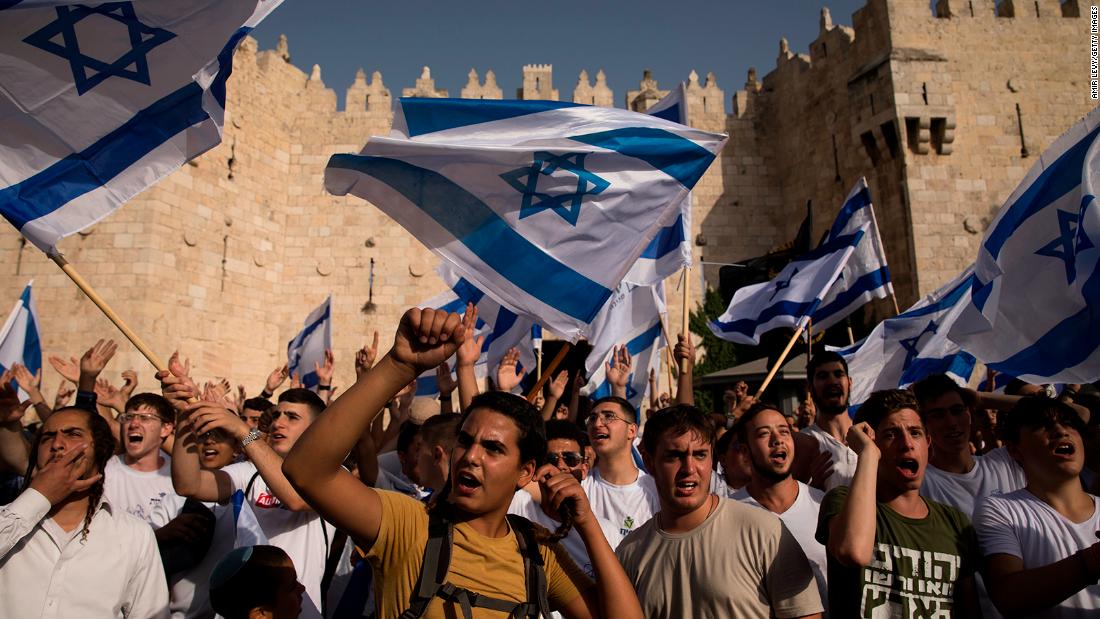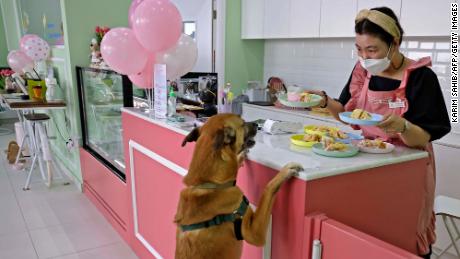
It was a chaotic Sunday in the narrow streets of the Old City as clashes broke out between the marchers and Palestinians as well as Israeli police and Palestinians. CNN’s team on the ground witnessed several violent encounters where marchers attacked Palestinians and journalists — including CNN staff — with pepper spray, as well as sticks and bottles thrown at reporters gathered to cover the march. Police were seen tackling an older Palestinian man who had placed himself between reporters and the marchers to wave a Palestinian flag.
Several Israeli politicians condemned the actions of the participants, while commentators noted that the march has become overrun by right-wing extremists and Jewish settlers — and is largely avoided by secular Israelis and ultra-Orthodox Jews.
Israel considers both eastern and western sectors of Jerusalem as its “undivided capital.” Most of the international community considers the eastern sector as being occupied. East Jerusalem has a sizable population of Palestinians, who want that part of the city to be the capital of a future state.
“If anyone has not yet understood why the flag parade has become a show of bullying and violence, this video from Nablus Gate might be able to sharpen it,” she wrote, referring to one of the gates of the Old City. “My flag is not a weapon.”
Yedioth Ahronoth Columnist Nahum Barnea wrote that the day has been taken over by settlers and religious Zionists who turn it into a day that is “Not love for Jerusalem; but hatred for Arabs.”
The digest
Fourteen-year-old shot and killed by Israeli forces, Palestinians say
Zaid Saeed Ghuneim was shot and killed by Israeli forces in the West Bank town of Bethlehem late Friday, according to the Palestinian Ministry of Health. The ministry said he was rushed to hospital with bullet wounds in his neck and back, but doctors were unable to save him. The Israeli military told CNN that several soldiers in the Al-Khader area of Bethlehem were conducting a “routine security activity” in the area when “suspects hurled rocks and Molotov cocktails at the soldiers, endangering their lives”. In pursuing the assailants, the soldiers responded with live fire, injuring one of the suspects, according to the military.
- Background: Zaid’s family said he had just finished dinner and was on his way to his grandparents’ house when he was shot. His brother Yazan told CNN that his Zaid was hiding in a garage when Israeli soldiers cornered him. An eyewitness showed CNN a video she took immediately after the incident. In the footage, there is blood pooled on the floor of a parking garage and smeared across a car. She said she saw Zaid run into the garage and heard him plead for his life.
- Why it matters: This is the second killing of a minor by Israeli forces in less than a week, after a string of raids across the West Bank. While covering one of those raids, Palestinian-American journalist Shireen Abu Akleh was also shot and killed by what the Palestinian Attorney General described as a targeted attack by Israeli soldiers.
Court jails Egyptian former presidential candidate for 15 years
An Egyptian court sentenced former presidential candidate Abdel Moneim Aboul Fotouh and several prominent figures from the banned Muslim Brotherhood to lengthy jail terms on Sunday on accusations including plotting to overthrow the state. Aboul Fotouh was sentenced to 15 years in prison, subject to appeal, the court ruling said.
- Background: Aboul Fotouh quit the Muslim Brotherhood in 2011 after disagreements over the role of religion in politics and founded the more centrist Strong Egypt party, launching an independent bid for the presidency in 2012. The interior ministry later accused him of meeting Brotherhood leaders to stir unrest, which he denied. He was arrested in February 2018 after giving interviews that were critical of President Abdel Fattah al-Sisi, a month before Sisi was re-elected.
- Why it matters: Rights groups say thousands of politicians, activists and journalists are detained in Egypt after unfair trials or without legal basis. Aboul Fotouh is in his early 70s and according to his family suffers from several medical conditions.
Erdogan says he won’t let ‘terrorism-supporting’ countries enter NATO
Turkish President Recep Tayyip Erdogan said talks with Finland and Sweden about their joining NATO were not at the “expected level” and Ankara cannot say yes to “terrorism-supporting” countries, state broadcaster TRT Haber reported on Sunday.
- Background: Turkey challenged the bids from Sweden and Finland on the grounds that the countries harbor people linked to the Kurdistan Workers Party (PKK) militant group and others it deems terrorists, and because they halted arms exports to Ankara in 2019. Sweden and Finland have said they condemn terrorism and welcomed the possibility of coordinating with Ankara.
- Why it matters: Erdogan’s latest comments indicate his opposition to Sweden and Finland joining the Western defense alliance continues. Turkey’s objection is holding up a deal that would allow for a historic enlargement following Russia’s invasion of Ukraine.
What’s trending
Saudi Arabia: #Boycotting_Cafes
Saudia Arabia designated 2022 as the ‘Year of Saudi coffee,’ but some Saudi Twitter users are now calling for the boycott of coffee shops. What went wrong?
The social aspect of coffee drinking in Saudi Arabia is held dearly, with decorum dictating how coffee should be drunk and which hand it should be poured with. Coffee is a sensitive topic in the country and any threat to the culture surrounding it is taken seriously.
Saudis on social media say they’ve had it with what see as exaggerated prices for the drink as the culture moves from traditional Arabic coffee to Western-style cafes where a cup costs as much as 30 riyals ($8). Many users said expensive cups were “mostly ice” and tasted like instant coffee.
The rise of such shops introduced drinks like the “Spanish latte” (as a cafe con leche is known), the macchiato, and others. Twitter users pointed out that cheaper coffee options do exist, but people seek out “over the top” drinks.
According to Statista, the average price of coffee beans in Saudi Arabia also jumped from 28.6 riyals per kilogram in 2011 to 38.9 in 2020.
The government, in an effort to capitalize on the global coffee craze, plans to localize production. This month, the kingdom’s sovereign wealth fund established the $320 million Saudi Coffee Company, aiming to play a role in “developing sustainable coffee production in the southern Jazan region, home to the world-famous Coffea Arabica.”
By Mohammed Abdelbary
